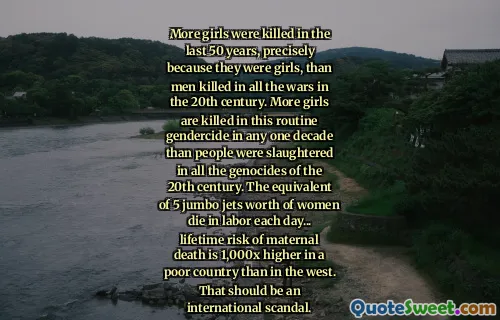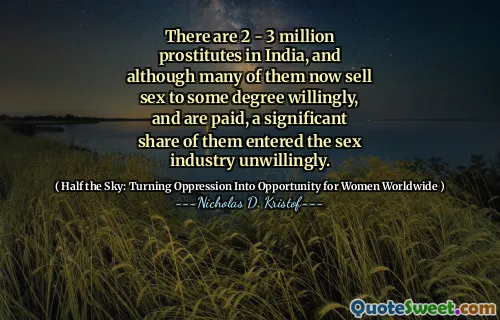
More girls were killed in the last 50 years, precisely because they were girls, than men killed in all the wars in the 20th century. More girls are killed in this routine gendercide in any one decade than people were slaughtered in all the genocides of the 20th century. The equivalent of 5 jumbo jets worth of women die in labor each day... lifetime risk of maternal death is 1,000x higher in a poor country than in the west. That should be an international scandal.
This quote starkly highlights the brutal realities faced by girls and women worldwide, shining a glaring light on systemic gender-based violence and disparities that are often overlooked or normalized. The staggering comparison — more girls killed over fifty years simply for being girls than men killed in a century of wars — underscores the severity of gendercide, a silent epidemic rooted in deeply ingrained cultural, economic, and social inequalities. Furthermore, the routine Kerr commitment of female lives through neglect, violence, and inadequate healthcare exemplifies how gender discrimination manifests in everyday violence—often considered 'routine' rather than urgent.
The statistic that five jumbo jets' worth of women die daily in childbirth reveals an urgent female health crisis, especially in impoverished regions where maternal healthcare is alarmingly inadequate. This disparity emphasizes the gross inequities in global health systems and resource allocation, calling for international attention and action. The peril women face in maternal mortality starkly contrasts with experiences in wealthier nations, highlighting issues of equity and justice.
Such statistics are not mere numbers, but poignant reflections of global injustice. They implore us to consider our collective responsibility—to advocate for policy changes, to support worldwide health and gender equality initiatives, and to challenge cultural norms that perpetuate violence against women. It is a call to regard this injustice not just as a statistic but as a moral imperative that demands international intervention and persistent activism. Recognizing these atrocities as scandals rather than accepted tragedies is a vital step toward meaningful change, fostering an awareness that can drive global cooperation for a more equitable world.







